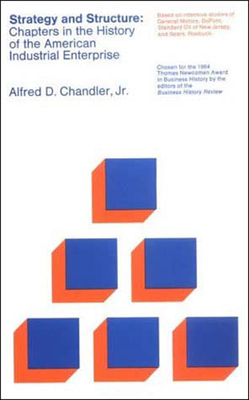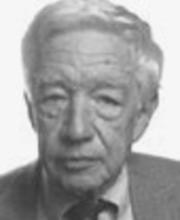

 MIT Press
MIT Press
Strategy and Structure: Chapters in the History of the American Industrial Enterprise


Key Metrics
- Alfred D Chandler
- MIT Press
- Paperback
- 9780262530095
- 7.82 X 5.42 X 0.94 inches
- 1.09 pounds
- Business & Economics > Leadership
- English
 Secure Transaction
Secure TransactionBook Description
Author Bio
A specialist in business and economic history and a faculty member of Harvard Business School since 1970, Professor Chandler previously taught at Massachusetts Institute of Technology and Johns Hopkins University, and was a Visiting Fellow at All Souls College, Oxford. His major books include Strategy and Structure: Chapters in the History of the Industrial Enterprise; The Visible Hand: The Managerial Revolution in American Business; and Scale and Scope: The Dynamics of Industrial Capitalism. He was assistant editor of four volumes of The Letters of Theodore Roosevelt; and editor of five volumes of The Papers of Dwight D. Eisenhower. In 1995, Professor Chandler was awarded the honorary degree of Doctor of Laws by Harvard University.
Professor Chandler died in May 2007._He was a charter Senior Fellow of the Ethics Center, one of a group of_distinguished_Harvard faculty members supporting the idea, in 1986, of an ethics initiative at the University.
Obituary
Alfred D. Chandler Jr. was Isidor Straus Professor of Business History, Emeritus, at the Harvard Business School. A renowned Pulitzer Prize-winning historian, Professor Chandler's greatest accomplishment (according to one colleague) was to "establish business history as an independent and important area for study." His death in May 2007 ended a long, legendary career, in which he chronicled and analyzed big businesses around the globe in a prolific and influential corpus of books and articles._
Like no one before him, Chandler investigated the dynamic factors that made the American economy and its businesses succeed so triumphantly in the late 19th and early 20th centuries. The key factors, as Chandler saw them, were the rise of the railroad, concentrated urban markets, mass production techniques, electrification, the internal combustion engine, and research and development. In essence, he concluded that the creation and development of modern managerial capitalism was the driver of American business success. "What counts are people - their skills, knowledge, and experience," he said.
"Al Chandler revolutionized the field of business history and nurtured it at this School with the help of outstanding colleagues who worked closely with him and admired him as a mentor and friend," said Jay O. Light, dean of Harvard Business School. "Through his teaching and research, and the comprehensive collection of papers he donated to our library's historical collections, he has left a lasting mark on scholars and students at HBS and far beyond."
In "Strategy and Structure," published in 1962, Chandler examined four U.S. industrial giants from the 1900s to the 1940s, focusing on the executives who devised the decentralized, multidivisional structure of the large corporation. The book helped spawn the field of corporate strategy and made the maxim "strategy precedes structure" a staple of corporate management during the 1960s and 1970s.
In "The Visible Hand: The Managerial Revolution in American Business," which won the Pulitzer Prize in history in 1977 as well as the prestigious Newcomen Award and Bancroft Prize, Chandler argued that the visible hand of management had replaced, in Adam Smith's words, the invisible hand of market forces in coordinating and allocating the resources of the economy as a result of the coming of the railroads and the telegraph in the 1800s. Although there was little need for middle managers prior to 1840, Chandler concluded, by the mid-20th century, the multiunit, multifunctional enterprise administered by salaried managers had become the "most powerful institution in the American economy."
Chandler continued to do research and write until the very end of his life. In 2001, he wrote "Inventing the Electronic Century: The Epic Story of the Consumer Electronics and Computer Industry," which focused on the fall of the Radio Corporation of America (RCA) and the rise of Sony and Matsushita, as Japan conquered the worldwide consumer electronics market. That volume was followed in 2005 by "Shaping the Industrial Century: The Remarkable Story of the Evolution of the Modern Chemical and Pharmaceutical Industries." At the time of his death, he was writing a biography of his maternal grandfather, Maj. William G. Ramsay, the first chief engineer of the E.I. DuPont de Nemours chemical company, who helped transform that firm from a family company into a global corporation.
"Al Chandler was an extraordinary scholar whose research and publications over five decades exercised a transformational effect far beyond his own discipline in business history," said Geoffrey G. Jones, the current Straus Professor of Business History. "Although he began his career as a traditional historian who labored long and hard in archives, his resulting insights on the growth of firms and the emergence of modern management were so compelling that he became a major formative influence on many areas of management studies. Al never departed from his central concern to document and understand the history of firms and managers in driving innovation and creating wealth."
Writing in his 1988 book, "The Essential Alfred Chandler: Essays Toward a Historical Theory of Big Business," Thomas K. McCraw, who succeeded Chandler as Straus Professor, also caught the essence of a man who was universally regarded not only as a true academic giant but as a true gentleman. "Chandler's most striking trait, in all his personal relations, remains a pronounced lack of pretentiousness. From the beginning of his career, his primary motivation has been an abiding and sometimes obsessive intellectual curiosity. Even after [many decades] as a working historian, he retains a youthful excitability, an infectious enthusiasm about the latest item he has read or piece of evidence he has uncovered."
Alfred DuPont Chandler Jr. was born in Guyencourt, Del., near Wilmington, on Sept. 15, 1918. According to family lore, Chandler announced his decision to become a historian by the age of 7, inspired by his reading of Wilbur Fisk Gordy's "Elementary History of the United States," a primer designed for sixth-graders that had been given to him by his father. He read it from cover to cover 19 times.
Chandler attended Phillips Exeter Academy, winning a prize for excellence in history before entering Harvard College, where generations of his family had studied from the 18th century on. He received his bachelor's degree, magna cum laude, in 1940.
Like his classmate John F. Kennedy, Chandler became an officer in the United States Navy during World War II, interpreting aerial reconnaissance photographs of German and Japanese territory taken before, during, and after bombing raids. According to McCraw, this assignment left a lasting impression on the aspiring historian, who would later examine the significance of logistics, industrial production, and change in national economies. After the war, Chandler enrolled in a graduate program at the University of North Carolina, Chapel Hill. Having written a 186-page honors thesis at Harvard College on the gubernatorial election of 1876 in South Carolina, he intended to study Southern history.
At Chapel Hill, however, Chandler came under the influence of two prominent sociologists and decided that the study of regional history was not where his future should lie. After a year, he returned to Harvard to continue his graduate work under the great Harvard sociologist Talcott Parsons, who introduced him to the work of Max Weber, Emile Durkheim, and the entire tradition of historical sociology. [This experience] guided [Chandler] toward the broad, systemic generalizations that characterized his work and which the sub-discipline of business history so badly needed."
In search of a topic for his doctoral dissertation, Chandler made a fortuitous discovery that would establish his life's work and ultimately shape the course of business history. He literally stumbled upon the papers of his great-grandfather, Henry Varnum Poor, a founder of Standard & Poor's Corp. and a well-known 19th century railroad analyst, while cleaning out a storeroom in his great-aunt Lucy Poor's home in nearby Brookline, Mass. Henry Varnum Poor had sketched the histories of more than 100 early American railroad companies and the systems of finance that funded their growth, and his papers were a treasure trove of firsthand accounts of the crucial role railroads played in the development of modern business practices. These materials became the basis of Chandler's doctoral dissertation, which evolved into a book, "Henry Varnum Poor: Business Editor, Analyst and Reformer."
The volume represented nothing less than a comparative history of the great American railroad corporations during their formative years, according to McCraw, and initiated a pattern of research that would remain Chandler's hallmark - absorbing prodigious amounts of diffuse data, including company histories, corporate archives, annual reports, trade publications, and business memoirs, and organizing them into coherent patterns of interpretation.
After earning his master's degree in 1947 and his Ph.D. in 1952, Chandler taught at the Massachusetts Institute of Technology (MIT) from 1950 to 1963 (except for a semester's leave in 1954 to teach at the Naval War College in Newport, R.I.). At MIT, besides writing "Strategy and Structure," he helped edit four volumes of Theodore Roosevelt's letters.
In 1963, Chandler was asked to join the faculty of the Johns Hopkins University, where he chaired the history department.
After seven years in Baltimore, however, Chandler felt he needed more time to pursue his own research interests. He was even prepared to leave academia to begin work on "The Visible Hand" when the then-HBS dean, Lawrence Fouraker, invited him to join the Business School faculty in 1970, where he served until 1989.
In addition to his teaching, course development, and research, Chandler was editor of "Harvard Studies in Business History" and on the editorial boards of major historical journals. He served as president of the Economic History Association and the Business History Conference.
Chandler was a visiting fellow at All Souls College, Oxford; a visiting professor at the European Institute of Washington; and a Guggenheim Fellow from 1958 to 1959. He was also a member of the American Philosophical Society and a Fellow of the American Academy of Arts and Sciences.
Chandler received numerous honorary degrees from universities around the world, including Harvard, which honored him in 1995.
Source: Edmond J Safra Center for Ethics, Harvard University
Videos
No Videos
Community reviews
Write a ReviewNo Community reviews